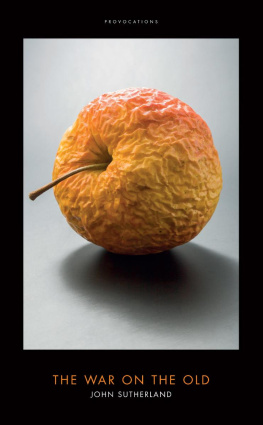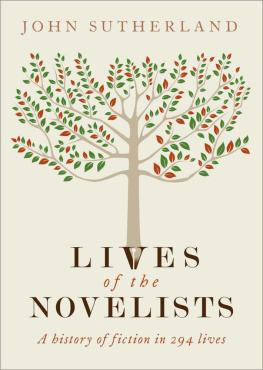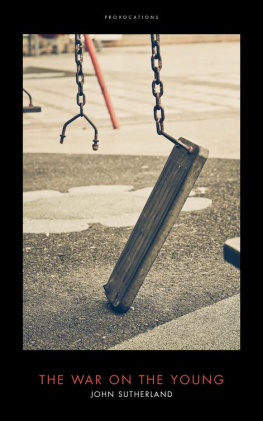Youth is wasted on the Young.
which is a good thing, of course.
Perhaps the War to come will not be between the rich and the poor, but between the Young and the Old.
T HIS, AS THE title of the series (Provocations) proclaims, is a polemic. At times, perhaps, a rant. In it I iterate and reiterate a main point: that there is a covert, but state-condoned, campaign against the nations old. By analogy with ethnic cleansing it could be called demographic cleansing. I have called it war. Call it what you will, its happening; there are casualties hundreds of thousands of them and its wrong. Very wrong.
Where the treatment of the British elderly is concerned, we would really rather not know. Even when the facts are staring us in the eye. I open The Times of 16 August 2016, for example (it is todays issue as Im writing). The first five pages of the paper are taken up by hosannas for apple-cheeked young Britons winning gold for their country in far-off Rio. Hip hip.
On page 11 of the paper, my eye is struck by three, ostensibly unthrilling, stories. The main article on the page is entitled Dementia Patients Face a Care Lottery. It opens: Dementia patients are facing a post-code lottery with figures showing that the quality of care varies wildly around the country in some areas, patients routinely go a year without having their condition reviewed.
For reviewed, read given a damn about. The article unexcitedly written (the news is, after all, wholly unexciting) notes that more than 850,000 people in Britain have dementia. A goodly number, one would have thought. Twice the circulation of the newspaper. Four times the size of the current UK army. For most of those sufferers the chances of getting adequate care are less than hopeful. If they do, as in every lottery, it is down to luck.
Below the fold, on the same page 11 of The Times, there is a story entitled Thousands Have Surgery Cancelled at Last Minute. Again, the figures are considerable. The piece reports: Nearly 77,000 patients had operations cancelled on the day that they had been due to take place last year. Each day, 210 operations for hip replacements, cataracts and other non-urgent surgeries were called off at the last minute.
The specified ailments are, of course, those most common, universal almost, among the aged. They might regard (readily curable) physical immobility and (readily curable) blindness as rather urgent surgery. But who, among the younger tens of millions, cares about those old wrecks? Take a ticket and go to the end of the queue, old-timers; theres a child with a broken ankle who needs urgent attention.
A third story on the same page 11, snuggled into the right-hand corner, is headlined Abrupt Receptionists Deter the Sick from Visiting GPs. Deterrence takes the form of rude, barking, dismissive voices at the other end of the phone receptionists doing as they are encouraged to do by the GPs themselves.
The article explains: Academics have confirmed that many patients are having to struggle with unhelpful receptionists to get seen by the NHS. But who is most susceptible to this widespread bugger-off in the surgery? The old, frail, timid and servile. People in my state of life, if Im honest.
All this is in a newspaper but its not news. Call it confirmation, were any needed, of normalised neglect something so institutional that it barely merits passing mention on page 11 of the nations newspaper of record. Indeed, one suspects, the neglect is bigger than merely institutional: its nationally condoned. Climatic, insofar as the state can make the weather for us. But dont make a noise about it. Theres that interesting story about that adorable young Lott couple: love and jockstraps.
The Telegraph were still with 16 August 2016, incidentally has the following story that day. The paper caters for a mature readership and the report is given some prominence:
Elderly people needing to go into a care home now face average fees of 30,000 a year, as costs are rising ten times faster than pensioner incomes, a study has found.
A study by Prestige nursing, one of the UKs biggest care agencies, has shed light on the UKs desperate and worsening care crisis, with the annual cost of a care home room increasing by 1,536, or 5.2pc over the past year. This is almost ten times more than the average 156 (1pc) income gains earned by pensioners over the same period, suggesting that paying for care without spending savings is becoming unaffordable even for the wealthiest pensioners.
The paper quoted Ros Altmann, the former pensions minister, as saying:
Anyone who has some savings will have to spend all their money on care before receiving means tested council support and those who need to go into residential care face crippling costs as fees keep rising. Most people will be forced to sell their homes unless they can find money elsewhere.
Where, one may ask, does that money, if they find it, go? Obviously a chunk goes into the care which is glossily advertised in the homes brochures. But another sizeable chunk dribbles into the pockets of the privatised profiteers running the system. You didnt, did you, think it was a charity? You dont have the money? Sod off. We dont care.
Those wanting material more blood-curdling than hundreds of thousands of oldsters contemplating their countrys indifference to their plight may usefully have called up Google News the same day (16 August) and slotted in Elderly Abuse on the search bar.
The grisly chronicle of Ashbourne House care home is promptly shot onto the screen. The establishment, located in Middleton, Greater Manchester and run, with a clutch of other so-called homes, by the commercial firm Silverdale, provides accommodation for up to 29 people over 65 who require nursing or personal care including residents with dementia and learning disabilities. Silverdale is a comforting name calling up imagery of silver strands among the gold and the rolling countryside of Lancashire. Our Companys Core Values are proudly proclaimed online:
Silverdale Care Homes Ltd has established a Philosophy Of Care approach which is reflected in its high standards of care and promotion of residents independence. Our philospohy [sic] translates into practice and our residents receive the best of care through our person-centered approach that respects privacy and maintains dignity.
On 16 August, as the ever-ready Mr Google reminds us, two Ashbourne nurses (carers) have been convicted and are awaiting sentence for the unusual version of person-centred care they practised while in Silverdale employ. The story first came to light on 25 January 2016. The Daily Mail made it a front-page story under the headline Shocking video captures two care home workers taunting dementia sufferers by torturing the comfort dolls they believe are real babies.
Such dolls are given to women with dementia to soothe them. Some vulnerable residents, the Mail added, poignantly, come to see the toys as their own real children.
Imaginative therapy, one would have thought. But a secret camera had been installed at Ashbourne. It showed nurses taunting residents by torturing their dolls. As the paper reported with lavish clinching illustration:
Sickening video footage shot at Ashbourne House nursing home appears to show a member of staff throwing the doll to the floor, distressing its elderly owner. And photographs show the dolls being hanged, put in a tumble dryer and apparently being cooked in a saucepan on a hob Another photograph shows an elderly woman appearing distressed as her doll is snatched out of her hands, while there are also images of a doll face down in a fish tank










